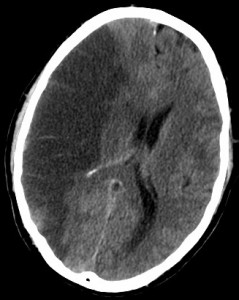Failure to Diagnose a Stroke
Failure to diagnose a Stroke in a timely manner can result in serious injuries or even death.
 Stroke is the third most common cause of deaths in the United States, second only to heart diseases and cancer. Stroke occurs when the oxygen supply to the brain is reduced or completely cut off. In almost 85 percent of stroke cases, the oxygen supply is cut off because of an obstruction such as a clot in the artery. Only 15 percent of stroke cases are caused by blood leakage to the brain caused by a broken blood vessel.
Stroke is the third most common cause of deaths in the United States, second only to heart diseases and cancer. Stroke occurs when the oxygen supply to the brain is reduced or completely cut off. In almost 85 percent of stroke cases, the oxygen supply is cut off because of an obstruction such as a clot in the artery. Only 15 percent of stroke cases are caused by blood leakage to the brain caused by a broken blood vessel.
The first type of stroke is known as an Ischemic stroke. People who have recently undergone an invasive surgery are at a higher risk of developing a blood clot that can cause a stroke. Stroke can also be a hereditary condition. No matter what the cause of a stroke is, timely diagnosis and treatment is essential. Delay in treating a blood clot can cause anorexic brain injury resulting in severe physical, mental, emotional, and/or behavioral disability. It is extremely important that the stroke is immediately diagnosed and treated. The longer diagnosis and treatment are delayed, the higher the chance of a brain injury occurring.
Diagnosing a Stroke
It is important that doctors correctly identify the signs and symptoms of a stroke, and order appropriate tests to confirm the condition. Here are some signs of a stroke that patients and doctors should watch out for:
- Inability to speak
- Inability to comprehend speech
- Visibility problems
- Problems walking
- Confusion
- Severe headache
- Dizziness
- Sudden loss of strength or numbness on one side of the body
When a patient comes to the emergency room with any of the above mentioned symptoms, it is the duty of the doctor to order appropriate tests such as a physical exam, blood tests, computerized tomography, magnetic resonance image, carotid ultrasound, and arteriography. Any of the aforementioned tests can help diagnose a stroke. It is important that the tests are ordered in a timely manner.
Failure to Diagnose a Stroke
However, in many cases doctors are negligent in diagnosing a stroke and providing timely treatment. Some common examples of cases of medical malpractice pertaining to stroke are:
- Failure to order diagnostic tests to identify blockage caused by blood clots, in order to establish the possibility of stroke
- Failure to provide tissueplasminogen activator (TPA) to the stroke patient
- Misdiagnosis of a stroke as some other medical condition, resulting in delayed or improper treatment
- Surgical errors or mistreatment during surgery that causes hypo-tension and leads to stroke
- Failure to provide anti coagulation treatment to patients with signs of preventable stroke
Medical Malpractice Lawyers – St. Louis, MO
Medical errors committed during diagnosis or treatment of stroke can have life threatening implications for patients. The damage that a patient and their family may experience can be devastating. A patient may become permanently disabled or may even die. If you or someone close to you had a stroke misdiagnosis, contact a St. Louis Medical Malpractice Lawyer at our law firm. We can evaluate your case for free and help you recover compensation for you losses.
Free Consultation – (314) 588-7200
Missouri Medical Malpractice Lawyer
If you have suffered as a result of medical malpractice, contact our legal team right away. Waiting to seek legal representation can prevent you from filing a claim and receiving the compensation you deserve.
Contact Zevan Murphy today.
